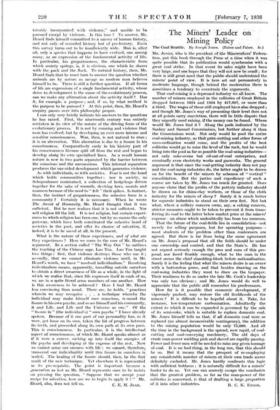- The Miners - Leader_ on Minh* . Y . 7 7 The Coal
Scuttle: By Joseph Jones. • (Faber and Faber. .5s.) Mn: JONES,` who is the president, of the Wineworkers'Fedem. tion„ put this book through. the PreSS -at a. time when it was quite possible that its publication would. synchronise. with a great coal strike, In that event its sales .might have been Very Ittrge, and one hopes that they, will not now be small„; for there is still great need that the public should nuClerstand: the miners' point of view. It is here set out persuasively in Moderate language,- though behind the MOderation there is sometimes a tendeney to 'overstrain the argurnentS. That coal-.mining is a depressedindustrYweallinnw. .-The number of miners ,employed in the collieries of Great -Britain dropped between 1924 and 1984 by 417;687, or .rinore than a third. The wages Of those still empiciyed•have also. dropped ; and though Mr.: Jones's way of.presenthig their level does not at all points carry conviction; there Will be little -dispute. that they urgently need raising, if the money can be:found.: Where would Mr. Jones find it ? -Along the path- indicated by the Sankey and Samuel Commiasinns; but further along. it than the CoiruniSsione, Went: Not: okay would pdol . the entire coal-Mining induitry,..so thakprice-eutting. and Other forms of unco-ordination would' cease, and. the profits of the best collieries viotild-gii to raise the must of the nick, tint he would bring into the-pool as far as possible the eoaluSingindastries- not only. coke-ovens- but - oil-out-of-coal - enterprises, and eventually even electricity works.and gasvvotki.. The general argument is that-since the Coal-getting imbistrk does not pay and the coal,using industries:do, the latter onght.to be .drawn on for the benefit. Of the Miners by .schemes: of ”Vertical " Consolidation.: But the :justice . and . expediency -of such a course are taken. :by Mt. :Jones' too Much :for granted. • Does anyone claim .that-the profits of the pottery industry should be drawn on ..for ehina.clay workers, eir...thoSe of the cloth industry for the raisers of sheep ? Surely :it it much better for separate industries. to stand on their MIT feet. Not but what, where a. colliery concern owns, a coking concern, stricter measures ought to be taken to prevent it from trans- ferring its coal to the latter below.market.Price at the miners' expense—an abuse *hi& undoubtedly has been too common.
That the future of the coal-fieldS lies in consolidation—not merely for . selling.pinpoies,; but .for operating purposes— most student's of the 'problem other than coalowners are agreed. But there is far from being the same agreement on Mr. Jones's proposal that all the fields should be under one ownership; and control, and that the State's. He has not argued seriously enough the pros and cons of this pro- posal, -nOr faced-frankly, enough, what to. the. man in the street seems the chief_ stumbling-block before nationalisation.
Surely it is the feeling-that what the. miners desire is an owner with • a :bottomless- purse, and that besides drawing on the coal-using industries: they. want- to :drawon the taxpayer. Their readiness to do so tmder:the late Mr. Cook's leadership was only too 'obvious ; ' and Mr. Jones would do well to appreciate that the public still remember his predecessors.
How far is it possible that economic development, if vigorously pushed, may restore the old livelihoods of the miners ? It is difficult to be hopeful about it. Take, for instance, low-temperature carbonisation. Admittedly' the extent to which it can be expanded is governed by the sale of its semi-coke, which is suitable to replace domestic coal.
Mr. Jones himself tells us that, if all domestic coal were so replaced (an almost inconceivable contingency), the addition to the mining population Would be only 75,000. And all the time in the background is the spread, now rapid, of coal- cutting and coal-conveying machinery. The old days of crude man-power wielding pick and shovel are rapidly passing. Fewer and fewer men will be need,edto.raise any given tonnage of;coal. 'It is nct'badthing,.in the long run, that this should be - so. But it mean that the prospect of re-employing any considerable number of miners,at their ownt trade seems definitely excluded. Mr. Jones hardly confronts this logic with sufficient boldness ; it is naturally difficult for a miners' leader to do so. Yet one can scarcely escape the conclusion that the greatest problem, so far as the man-power of the collieries is concerned, is that-.of drafting alarge, proportion














































 Previous page
Previous page